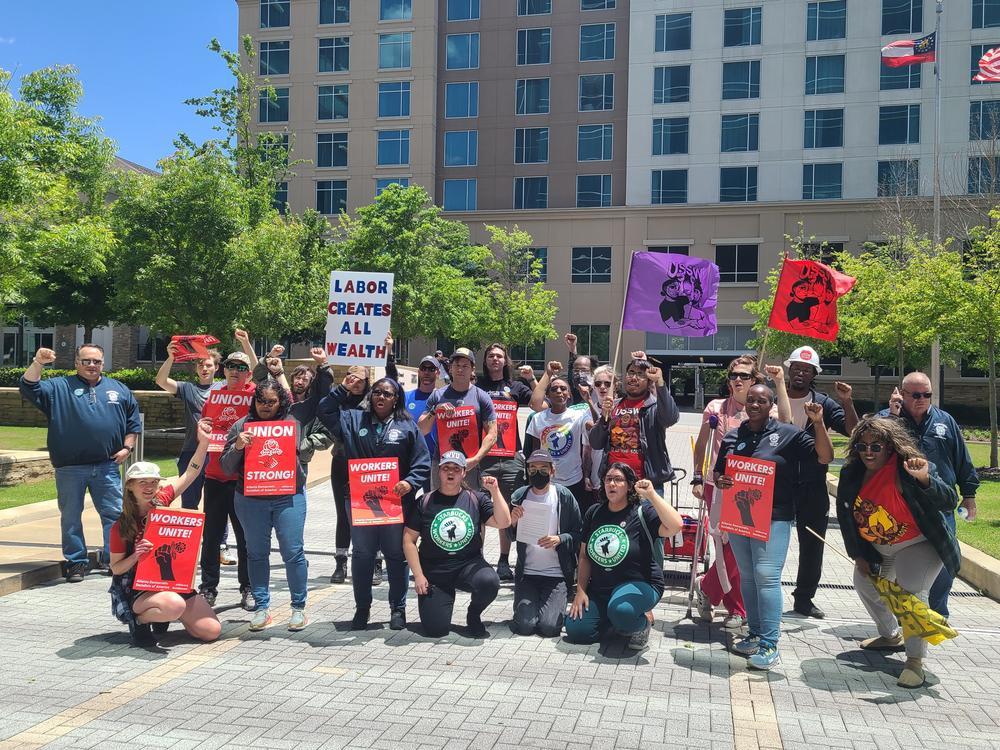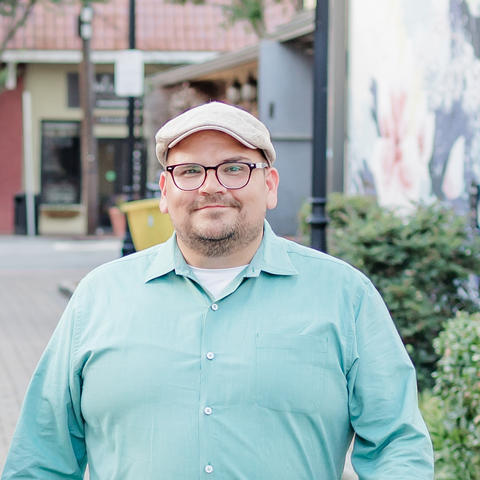
Section Branding
Header Content
Georgia Today: Kemp signs insurance bill; Starbucks workers rally; MARTA raises autism awareness
Primary Content
On the Tuesday, May 2 edition of Georgia Today: Gov. Brian Kemp signs a bill creating Georgia's own state-run health insurance marketplace; Atlanta Starbucks employees demand better working conditions; and a new program to raise awareness of autism is launching on MARTA.

Peter Biello: Welcome to the Georgia Today podcast from GPB News. Today is Tuesday, May 2. I'm Peter Biello. On today's episode, the governor signed a bill today creating Georgia's own state run health insurance marketplace. Starbucks employees rallied in Atlanta, demanding better working conditions. And a new program to raise awareness of autism is launching on MARTA. These stories and more are coming up on this edition of Georgia Today.
Story 1:
Peter Biello: Gov. Brian Kemp signed a slew of health care bills at the state capitol today, including a measure that would create a state-run health insurance exchange. GPB Stephen Fowler has more.
Stephen Fowler: Health care access has been one of the governor's focus areas since his first term began in 2019, and this year, lawmakers passed a number of bills connected to that effort. That includes a new state-run health insurance exchange that would replace the federal healthcare.gov, if the Fed approves a waiver for it.
Brian Kemp: SB 65 gives Georgians what they deserve: a better way of knowing and comparing their health care insurance options. That's what the state-based health insurance exchange created by this legislation will do, bringing further competition to the field.
Stephen Fowler: Other legislation signed includes expanding cash assistance benefits to low-income pregnant women, a bill requiring insurance companies cover biomarker testing for cancer patients and increased penalties for anyone convicted of assaulting a health care worker. For GPB News, I'm Stephen Fowler.
Story 2:
Peter Biello: Northeast Georgia Health System and UnitedHealthcare are parting ways after months of unsuccessful negotiations. The contract between the Gainesville-based health system and the insurance giant expired yesterday. Patients with United's commercial plans no longer will be considered in-network at any of the system's facilities.

Story 3:
Peter Biello: Starbucks workers rallied at the company's regional corporate office in Atlanta yesterday to hand over a list of demands for better working conditions at the coffee giant. GPB's Amanda Andrews explains.
Amanda Andrews: Unionized Starbucks workers in Georgia are demanding a $20 hourly pay, health insurance coverage, guaranteed hours in a safe environment for those in nonunion stores to organize. Atlanta Starbucks worker Amanda Rivera says this is about advocating for workers' rights.
Amanda Rivera: We would much rather be in the store making coffee and being able to go home and live our lives. But instead we have to be outside in the rain, in the wind and, you know, in the blazing sun because Starbucks will not legally come to the table, which they are legally obliged to do.
Amanda Andrews: Georgia locations with unions include Atlanta, Alpharetta and Augusta. According to the group Starbucks Workers United, more than 300 stores across the country are unionized. For GPB News, I'm Amanda Andrews.
Story 4:
Peter Biello: A monthslong spike in violence continues at a Georgia prison already known to be one of the state's deadliest. GPB's Grant Blankenship reports.
Grant Blankenship: The homicide of inmate Calvin Denson last Wednesday was followed by violence days later that required a number of inmates to be transported via air ambulance. These are just the latest incidents at Smith State Prison in Southeast Georgia's Tattnall County. Cellphone video leaked on social media depict inmates, sometimes a dozen or more, ganging up on single inmates on cell blocks where no prison guards can be seen. The recent spate of violence began back in February, when then-Warden Bryan Adams was arrested on racketeering charges stemming from his alleged involvement in a prison contraband ring. A spokesperson for the Georgia Department of Corrections says the violence comes as a new warden works to, quote, "regain order and control" at Smith's State. For GPB News, I'm Grant Blankenship in Macon.
Story 5:
Peter Biello: A new reactor at East Georgia's nuclear Plant Vogtle is one step closer to generating electricity. Georgia Power officials said yesterday that the plant has completed hot functional testing, which involves heating the reactor to extreme temperatures and pressures. It could reach commercial operation by the end of the year or early next year. Another reactor, the plant's third, is scheduled to begin commercial operation by June.

Story 6:
Peter Biello: Georgia farmers can now apply for new federal funding aimed at helping them transition to organic farming. GPB's Benjamin Payne reports.
Benjamin Payne: Learning the ins and outs of organic farming takes time and money. So to help farmers, the U.S. Department of Agriculture is releasing a new batch of funding to help cover the cost of education, to learn things like crop rotation and nutrient management. Terence Rudolph is the state conservationist for the USDA in Georgia.
Terrence Rudolph: On this instant here, we have $70 million. And so you can imagine that that seems like a lot of money, but when you start receiving a lot of applications that money could go pretty fast. So it is a competitive process.
Benjamin Payne: Rudolph says Georgia farmers who are interested should contact their nearest office of the USDA's Natural Resources Conservation Service. The deadline to apply is June 15. For GPB News, I'm Benjamin Payne.
Story 7:
Peter Biello: The first two medical cannabis dispensaries in Georgia opened last week in Macon and Marietta. More stores are planned for Columbus, Newnan and Pooler, and this comes eight years after state lawmakers first moved to legalize medical cannabis. Georgia is one of the last states in the nation to make this change. For a look at where the state's cannabis policy has been over the years and where it's going, we turn to David Bradford, professor of public administration and policy at the University of Georgia. He's been studying cannabis policy. So let's talk a little bit about the timeline of the legislation that the state has seen recently. State lawmakers legalized medical cannabis eight years ago, but not the sale of it. So what's happened in the intervening years that made lawmakers take those extra steps to get it to market?
David Bradford: Well, I think that that there always was the intention to not only legalize possession of these — this low-THC cannabis oil, but also make it available to the patients in the state who need it for medical purposes. It was just a process that took a little time. In addition, the very first legislation that approved the possession of this low-THC oil had a much more limited set of medical conditions it was approved for. That has subsequently been expanded. So as in many states, there can be quite a bit of time between the first passage of the first law that authorizes some access for cannabis and a functioning market. Now, Georgia took a lot longer than most states, but that it took a number of years is very typical.
Peter Biello: We're talking about low-THC products like cannabis oil, tinctures and capsules. The flower that people sometimes smoke is still illegal, but the state made the decision to allow low-THC products. So tell us the difference between THC and the other substance, CBD.
David Bradford: THC is the cannabinoid that does have medical benefits, the evidence suggests, but it's also the one that gives you the feeling of euphoria, the sense of being high. CBD does not do that. That's primarily an anti-inflammatory and seems to be the — the primary cannabinoid that's helpful for seizure disorders. And so when — the reason that we have low THC oil in the state is that the hope is, of course it would be less likely to be abused; less than 5% THC by volume. If you were to go up to Washington or Colorado — say Colorado, a very active retail, recreational legal market — the typical THC levels, there are going to be 20-25% by volume. And so we're talking about below 5%. However, it's also important to put in context[ ...]but if your listener thinks back to the 1970s, illegal marijuana that you might buy on the street there had THC levels of 2 or 3%. So even though this is relatively low THC levels, it's still something that people need to be pay attention to. It is still potentially intoxicating and it's still something that I do think Georgia's right to take careful steps to roll out because it's — just to say it's low-THC is not the same thing to say it's no THC.
Peter Biello: Doctors don't prescribe cannabis, though. They they have another process that the state has laid out. What is that process?
David Bradford: What physicians do is they fill out forms here in Georgia and in other states that certify that their patient has certain medical conditions. And so here in Georgia, there's a — there's a fairly long list seizure disorders, pain, nausea, cancer, a range of conditions. And what a patient would do is take forms that are provided by the Georgia [Medical Cannabis] Access Commission and have the doctor fill them out. And then the patient would present that to the state and get a cannabis access card. And then they'd be able to go to a dispensary and buy the product.
Peter Biello: State law now allows up to 30 licenses for retailers. Two stores opened last week. There's more to come soon. What's on the horizon for those companies who have licenses or are hoping to get one?
David Bradford: Well, what's on the horizon, of course, is that they've got to have a strategy for themselves that allows them to grow at an appreciable rate. They've got to have enough patients coming in the door to support them. And right now, the last estimate I saw was there's only about 28,000 patients with medical cannabis cards in Georgia. That's actually not a lot of people to support a wide, large number of stores. And so we don't want to move so fast with expanding outlets that they're not profitable and that creates its own set of problems.
Peter Biello: Let's talk taxes, because it seems like sales tax does apply to medical cannabis. Does the state have any plans for that money?
David Bradford: As far as I know, there are no plans. I have not seen any discussion of that myself. Now, this is not an area that I do my own research on. I will say that other states do have plans for their cannabis taxes, whether it's medical cannabis taxes or recreational cannabis in states like Washington and Colorado that have legal adult access. And oftentimes the tax rates are different for medical versus recreational cannabis. And in many states, the tax revenue will go explicitly to setting up the infrastructure to monitor and manage the medical or recreational cannabis program. It's expensive for the states to create agencies and infrastructure to do that. Taxes may be earmarked for education. Sometimes taxes are even earmarked for substance use treatment. But I'm not familiar — I'm not aware that Georgia has made that decision.
Mm hmm.
Peter Biello: David Bradford, professor of public administration and policy at the University of Georgia. Thank you very much for speaking with me.
David Bradford: Thank you for having me.

Story 8:
Peter Biello: The voices of children with autism spectrum disorder have been heard on public transit across the country this month, including on Atlanta's MARTA trains. GPB's Ellen Eldridge reports.
London: Help us keep MARTA clean. Please do not litter. Dispose of trash in bins.
Trey: Remember: sitting on escalators is not allowed. Safety first!
Ellen Eldridge: Those are the voices of London and Trey. They are just a few of the children with autism spectrum disorder featured on MARTA trains last month to promote acceptance of neurodiversity. The announcements are the brainchild of Jonathan Trichter, who founded the Autism Transit Project and is responsible for getting the voices of children with autism on MARTA.
Jonathan Trichter: So last year I had the idea to approach the MTA in New York City for Autism Acceptance Month to see if they would allow children to record the public service announcements that the MTA plays regularly. And to their credit, they agreed.
Ellen Eldridge: The kids' pieces ran on the MTA for only one day, but commuters loved it. So he invited more transit authorities to participate, and MARTA agreed.
Jonathan Trichter: So it turns out that in every small and large community, inevitably there's a Facebook group or social media gathering place where special needs families come to congregate online and trade information about services, schools, support. And I posted in one or two of those in the Atlanta area.
Ellen Eldridge: About a dozen local children volunteered to record announcements for MARTA. Lisa Stephens' son was one of them. She heard about the opportunity through a caseworker at the Marcus Autism Center.
Lisa Stephens: And she mentioned the Autism Transit project and wondered if Immanuel was interested in participating. And so after that, a few days later, one of the representatives from the Autism Transit Project contacted us and let us know how to submit the recording. And from there, that was it.
Ellen Eldridge: And Immanuel knew exactly what he wanted to talk about.
Immanuel: Hi, my name is Immanuel, and I really like trains. Please help us to keep MARTA clean. Please don't litter. Hope you enjoy your ride!
Ellen Eldridge: Jonathan Trichter says MARTA chose the announcements riders would hear.
Jonathan Trichter: That's up to MARTA's discretion, in terms of which were clear enough and which they were able to roll out. But I believe most of them are being played.
Ellen Eldridge: Trichter says running these pieces on public transportation connects to one of the common interests some children with autism have.
Jonathan Trichter: And that can often be feats of mechanical engineering that you encounter every day, especially trains.
Ellen Eldridge: Immanuel says he is proud of his appearance on MARTA.
Immanuel: I felt that when I made that important announcement, I felt like I did it all on my own. It was like the best thing I could ever do.
Ellen Eldridge: Similar announcements also appeared on transit systems in New Jersey, San Francisco and Washington, D.C. For GPB News, I'm Ellen Eldridge.
Peter Biello: And so ends another episode of Georgia Today. Thank you so much for tuning in. If you'd like to learn more about these stories, visit GPB.org/news. I've got some family flying into town, so I will be taking a few days off. But GPB's Orlando Montoya will be with you tomorrow. Remember to subscribe to this podcast. Once you do that, we'll be there for you every weekday afternoon in your podcast feed. If you've got feedback, we'd love to hear it. Send us an email. The address is GeorgiaToday@GPB.org. I'm Peter Biello. Thanks again for listening. We'll be back with you tomorrow.
___
GPB's Georgia Today newsletter hits your inbox on Tuesdays, Wednesdays and Thursdays with top stories from around the state featuring news, politics and more. Subscribe here.



